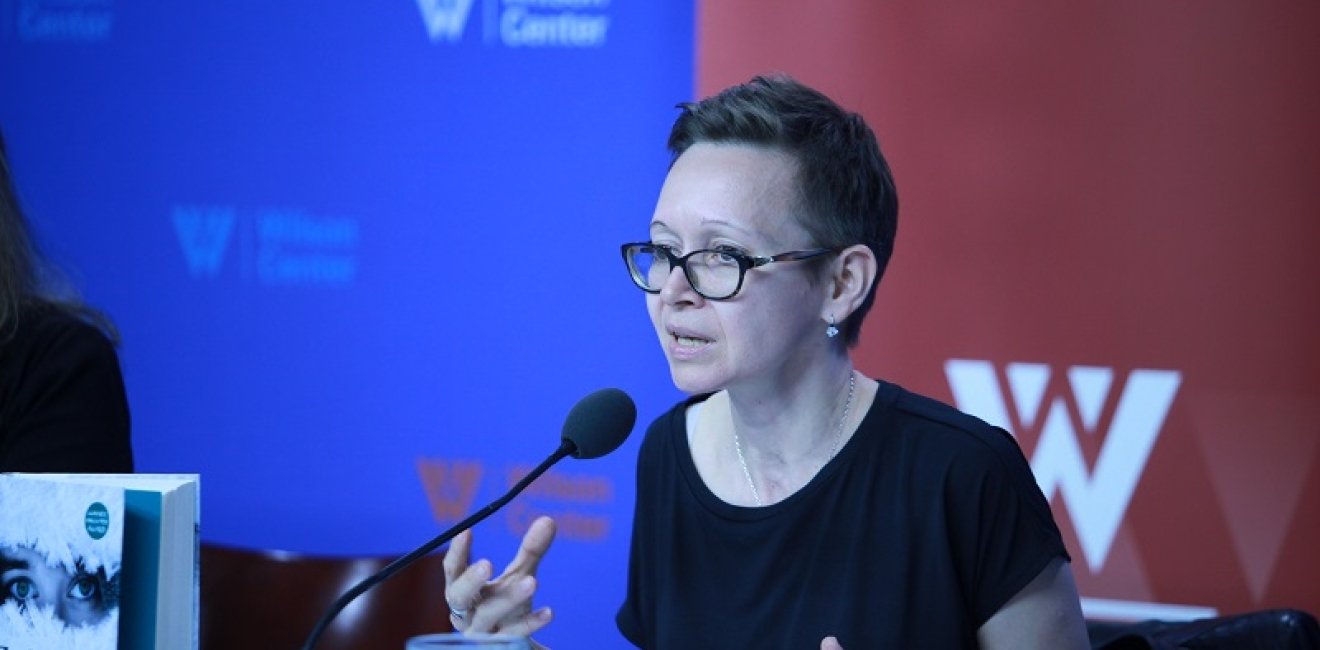
A blog of the Kennan Institute
BY IZABELLA TABAROVSKY
Guzel Yakhina’s debut novel, Zuleikha Opens Her Eyes, was first published in Russian in 2015. It tells the story of a young Tatar woman who falls victim to the Soviet collectivization campaign and is exiled to a Siberian settlement, where she has to start life anew. The book became not just a bestseller, it became a literary phenomenon. Having been translated into thirty-one languages, it is now being turned into a TV series in Russia. We spoke with the author when she visited the Kennan Institute to launch the English-language edition (titled simply Zuleikha). The interview has been translated from the original Russian, shortened and edited for clarity.
Izabella Tabarovsky: It’s been four years since Zuleikha Opens Her Eyes was first published. So much has happened to the novel and you since then: international acclaim, the upcoming TV series. You have already written a second novel. Has your relationship with Zuleikha as the book’s heroine and to the book itself changed over these years?
Guzel Yakhina: As my heroine, Zuleikha is still my baby, and my attitude toward her cannot change. What has changed is my attitude toward writing a book. When I was working on this novel, my first, I couldn’t imagine that it would be published and read. On the one hand, this created uncertainty; on the other it gifted me with incredible ease and creative freedom. This innocence was pure happiness. The writing felt free, it went quickly and easily. In some ways I was just dabbling, playing around.
Then the book was published, and I suddenly started getting letters from people who recognized their grandmother in Zuleikha. I got letters from people who’d gone through the experience of exile. That’s when I understood how great the author’s responsibility is for the text she creates. This was a completely new feeling that I had vis-à-vis the book. And this sense of responsibility naturally added a layer of complexity when I began to write my second book. That is probably the most crucial lesson I learned from my first book.
IT: Zuleikha takes place in the Soviet Union of the 1920s and 1930s. It’s the beginning of Stalin’s rule, collectivization, dekulakization, the establishment of gulag. Why did you decide to focus on that period?
GY: I am interested in early Soviet history, for many reasons. It was an incredible time—a time when everything seemed incredibly concentrated. On the one hand, it was a time of massive tragedies: the civil war, famine, repressions, and then the Great Patriotic War, World War II. On the other hand, it was a time of enthusiasm, of faith with a capital F, of an absolutely sincere hope that tomorrow the Soviet fairy tale would come true. And this melding of the gloomy, the cruel, and the tragic, on the one hand, and of the sincere and the light and of this furious joy on the other—all of this led to an explosion of literature and cinema in the late 1920s. And this combination, this incredible mix of all of it, of all these different emotions, is what really attracts me. It was also the time when my grandmothers and grandfathers were growing up. Having spent a lot of time in their homes, I developed an interest in their childhood: how that time shaped them and made them the people I got to know many years later.
IT: Zuleikha’s story is based on your grandmother’s story. Tell us about her.
GY: My grandmother was born in 1923 in a Tatar village. At the age of seven she and her parents were deported as kulaks. It was the winter of 1930. In January 1930 the Central Committee issued its infamous decree on liquidating kulaks as a social class in areas of continuous collectivization. The Volga region was one such area, and soon my grandmother’s family was picked up and sent by a very complex route to Siberia. They found themselves on the banks of a river—not the Angara River, as in the novel, but one of its tributaries. There my grandmother spent sixteen years of her life, from 1930 to 1946.
She returned to her village as a grown young woman with a teacher’s degree and great Russian, which she acquired in exile. (Before the exile she spoke only Tatar.) She had a lipstick and heels in her knapsack. This was a different, completely changed woman. And in 1946, a third stage of her life began, a new one that was, once again, different from her life in Siberia. But those sixteen years in a Siberian settlement had undoubtedly shaped her. She was a child of that settlement, and until she died, she kept in touch with those who had grown up with her there. For her, those ties were often more meaningful than family ties. And so in my novel I also wanted to convey that bond you shared with those who grew up in exile with you.
IT: This is what makes the novel so complex: it’s about the horrors of that time but also about how people adjust to that horror, evolve as a result of what they’ve been through, and even find happiness.
GY: Yes, this is exactly what I wanted to write about—that bitter happiness or a seed of bitter happiness that may be hidden in misfortune. In the first half of the book, Zuleikha is preparing for death. She is preparing for it from the moment her husband is murdered in January 1930 and throughout the entire six months that she travels with the other deportees to Siberia. Only the birth of a child turns around her readiness to die. She ventures to keep on living and to embark on a second life that is being proffered to her.
Later in that new life she finds things that give her a chance, not necessarily of happiness but of finding something new, which gives her a chance to change. Her baby survives despite all odds. A love interest unexpectedly appears in her life. Before that she didn’t know what it was to love a man and to be loved. In exile, she finds herself surrounded by very different people. And this environment, these people, change her.
IT: At the beginning of the novel, we are immersed in the world of a traditional Tatar village. You describe this world in tantalizing detail. In addition to telling your grandmother’s story, did you also want to show how collectivization affected the Tatar people specifically?
GY: I would say that the opposite is true: I wanted to talk about dekulakization and repressions levied against the peasants as a whole. It touched a huge number of people—five percent of Soviet peasantry—and today it’s part of family history for many people. My heroine is Tatar, yes, but gradually that Tatar world she lives in disappears from the novel and she is gradually transported into a different, international world.
Yes, in the beginning, the Tatar theme is very strong, and I did try to pour much of what I know about Tatar mythology, culture, and cuisine into those first chapters of the novel. But gradually, as Zuleikha moves away from her home, she sees completely different people around her, people of different ethnicities, faiths, cultures, and languages. She must learn to understand Russian, to communicate with other people, and these people change her. And I hope that the novel gradually transforms itself from a national story into a supranational one.
In the Siberian settlement where she finds herself, there are people of different ethnicities, and they have no choice but to get along with each other. This is probably one of the main messages of the novel—that in such a place, on the threshold of life and death, superficial things disappear, ethnic and social prejudices disappear, and people are left face-to-face with one another. These are the people I wrote about, people who sail in their version of Noah’s Ark over death, the taiga, the river, and in the end come out alive.
IT: Zuleikha is being adapted as a TV series. What are your expectations of it?
GY: I very much hope that the series will maintain respect for the big history—that of the tragedy of dekulakization—and won’t be turned into excessive melodrama. This is the key point for me, that the breath of big history be felt in the film. The other part that’s very important for me is that the creators find creative solutions to convey the many layers of the novel, including the mythological one. From what I’ve seen up to now—some photos, shots, and even the trailer that’s already being shown—it all looks promising.
Author


Kennan Institute
After more than 50 years as a vital part of the Wilson Center legacy, the Kennan Institute has become an independent think tank. You can find the current website for the Kennan Institute at kennaninstitute.org. Please look for future announcements about partnership activities between the Wilson Center and the Kennan Institute at Wilson Center Press Room. The Wilson Center is proud of its historic connection to the Kennan Institute and looks forward to supporting its activities as an independent center of knowledge. The Kennan Institute is committed to improving American understanding of Russia, Ukraine, Central Asia, the South Caucasus, and the surrounding region through research and exchange. Read more

Explore More in The Russia File
Browse The Russia File
Chechnya as a Model of Modern Russia

Russia’s Indigenous Communities and the War in Ukraine

Gas and Power in a Changing US–Russia Relationship

